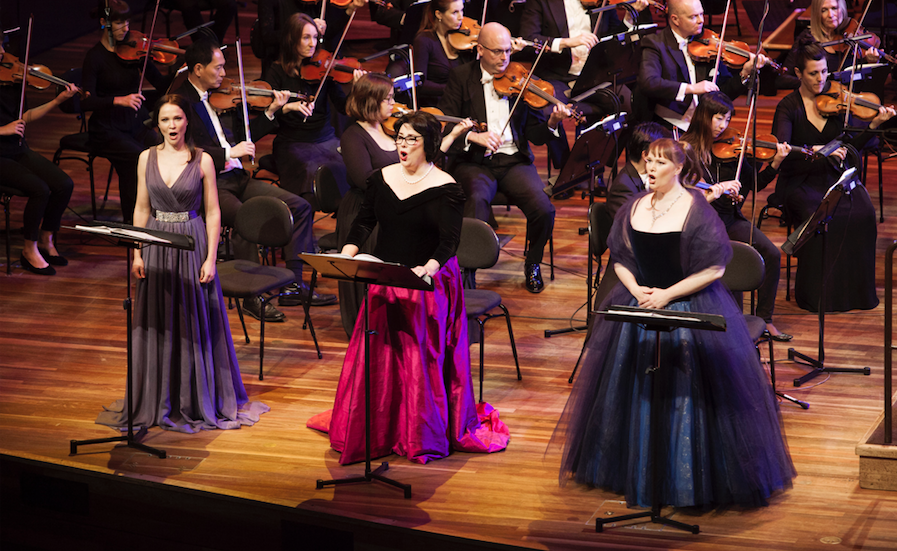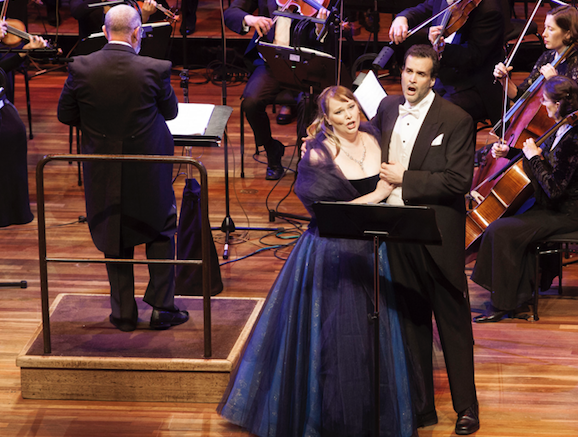Picture, if you will, a sleepwalker. Her name is Amina and she is betrothed to Elvino but is found asleep – much to her own surprise – in one Count Rodolfo’s room on the evening of her engagement. Accusing his distraught fiancée of infidelity, Elvino attempts to marry the local innkeeper, Lisa, instead. Alas, Elvino soon uncovers suggestions that Lisa, too, might have been romantically involved with Rodolfo. The Count – a lustful man, yes, but harmless – explains to an exasperated Elvino that Amina walks in her sleep, and that she is blameless. Elvino and Amina are reconciled. Fin.
 Greta Bradman, Roxane Hislop, Jessica Pratt. All photos © Charlie Kinross
Greta Bradman, Roxane Hislop, Jessica Pratt. All photos © Charlie Kinross
Felice Romani’s libretto to Vincenzo Bellini’s La Sonnambula is as unlikely as it is entertaining, and that is precisely the point of this style of opera. Bel canto is most closely associated with early 19th-century Italian opera and the work of Rossini, Donizetti and Bellini. The genre fell out of fashion in the second half of the 19th century, dismissed as virtuosic but not particularly serious music. Berlioz complained that the “music of the Italians is a sensual pleasure and nothing more… They want a score that, like a plate of macaroni, can be assimilated immediately without having to think about it.”
It seems Berlioz underestimated the qualities of Italian food and music, and was unable to predict the world’s love of both. It was in bel canto that the voice became firmly established as a unique kind of instrument in itself, the genre calling for a heightened mastery of both vocal technique and Italian diction. It nowadays represents the paradigmatic opera voice. While bel canto plots have often been the easy target of ridicule, as Victorian Opera’s Richard Mills wrote on the eve of his production of La Sonnambula, Bellini “left us a canon of enduring value; a unique and inimitable feeling for poetic expression in music, a dramatic sense which manifests in noble and heroic situation, and a legacy of melodies that unfold as if they were made in heaven for singers on earth.”
As early as 1901 a critic wrote that in La Sonnambula “is to be found the loveliest, most characteristic and most perfect flowering of Bellini’s genius.” By the mid-20th century, bel canto had staged a resurgence. Although it is not among the most well-known or regularly staged operas today, La Sonnambula has been something of a sleeper. It has attracted a long list of the world’s most celebrated singers, particularly sopranos, including Maria Callas – who helped revive the genre – and Australia’s own Dame Joan Sutherland.
It is from the wonderful Dame Joan that a connection is drawn to Victorian Opera’s 2017 concert performance of Bellini’s La Sonnambula featuring the much-lauded Jessica Pratt as Amina. In 2016, Pratt returned to Australia to perform with VO as Lucia in Donizetti’s Lucia di Lammermoor – additionally, Pratt was among only two other Australians, Sutherland and Dame Nellie Melba, to take the role of Lucia at La Scala in Milan. With Sutherland, she is the only Australian to have won the prestigious Italian award for coloratura sopranos, La Siola d’Oro. Indeed, throughout Friday evening’s performance Pratt often paid tribute to Sutherland’s own, well-loved interpretation of Amina.
 Jessica Pratt and Carlos Bárcenas
Jessica Pratt and Carlos Bárcenas
While Pratt was the star attraction, Orchestra Victoria offered a full and assertive performance of Bellini’s score, the orchestration of which has not been without its critics, while a chorus of peasant villagers was given ample room to gasp, accuse, and sticky-beak at the main cast under conductor Mills’ confident leadership. Relative newcomers Timothy Newton (bass) and Tomas Dalton (tenor), performed admirably in their roles – Newton eliciting much laughter in his portrayal as the luckless Alessio.
Mezzo-soprano Roxane Hislop gave a polished, pleasing, and heartfelt performance as Amina’s mother Teresa. Greta Bradman was satisfying throughout as the coy innkeeper, and delivered a wonderful aria in the second act. Bass Paolo Pecchioli was an audience favourite, his resonant voice carrying the role of Count Rodolfo and his on-stage persona – so important in a concert staging – provided much entertainment. Surtitles were by Brian FitzGerald, who evidently has a delightful sense of humour.
The role of Amina’s fiancé Elvino is only for the brave-hearted tenor. To wit, Nicola Monti – a stalwart of La Sonnambula recordings in the 1950s and 1960s – often struggled to match the talents of Margherita Carosio, not to mention the famed Callas and Sutherland. One almost feels pity for him. The promising Carlos Bárcenas should be applauded, then, for his performance alongside one of the most exciting sopranos in the world today. Contrastingly, the audience could barely contain its nervous excitement in Pratt’s presence (and rarely did, applauding at the slightest provocation). He brought sensitivity – and just the right amount of naiveté – to the portrayal of Elvino, and was perhaps most effective in his duets with Amina.
Which brings us to Jessica Pratt, who captivated from the moment she appeared on stage. It seemed improbable that she might surpass her rousing opening aria, Care compagne, yet as the evening progressed the audience grew increasingly rapturous, and Pratt led the opera to a spectacular close, reaching phenomenal heights in the final sections of Ah! non giunge uman pensiero. There is little more to say about Pratt that has not already been said many times before, and so I simply note that the rumours are true: her voice is exquisite, and Victorian Opera put on a damned good show.











Comments
Log in to join the conversation.